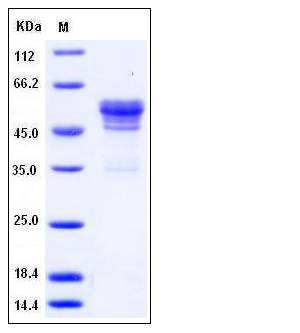Mouse CD99 / PILR1 Protein (Fc Tag)
1110061M03Rik,2410026K10Rik,D4,pilr-1,Pilr-l
- 100ug (NPP3252) Please inquiry
| Catalog Number | P50520-M02H |
|---|---|
| Organism Species | Mouse |
| Host | Human Cells |
| Synonyms | 1110061M03Rik,2410026K10Rik,D4,pilr-1,Pilr-l |
| Molecular Weight | The recombinant mouse CD99/Fc chimera is a disulfide-linked homodimeric protein. The reduced monomer consists of 350 amino acids and predicts a molecular mass of 37.5 kDa. As a result of glycosylation, the apparent molecular mass of rm CD99/Fc monomer is approximately 47-55 kDa in SDS-PAGE under reducing conditions. |
| predicted N | Thr 21 |
| SDS-PAGE |  |
| Purity | > 90 % as determined by SDS-PAGE |
| Protein Construction | A DNA sequence encoding the mouse CD99 (NP_612182.1) extracellular domain (Met 1-Gly 137) was fused with the Fc region of human IgG1 at the C-terminus. |
| Bio-activity | |
| Research Area | Immunology |Cluster of Differentiation (CD) |T Cell CD Antigen |
| Formulation | Lyophilized from sterile PBS, pH 7.4 1. Normally 5 % - 8 % trehalose and mannitol are added as protectants before lyophilization. Specific concentrations are included in the hardcopy of COA. |
| Background | The cluster of differentiation (CD) system is commonly used as cell markers in immunophynotyping. Different kinds of cells in the immune system can be identified through the surface CD molecules which associating with the immune function of the cell. There are more than 320 CD unique clusters and subclusters have been identified. Some of the CD molecules serve as receptors or ligands important to the cell through initiating a signal cascade which then alter the behavior of the cell. Some CD proteins do not take part in cell signal process but have other functions such as cell adhesion. CD99 is a transmembrane protein expressed on most hematopoietic cells, endothelial cells and at the borders between confluent cells. CD99 is also found expressed in the development of normal ovary and testis as well as in 25 sex cord-stromal tumors, 7 epithelial neoplasms, and 6 germ cell tumors. CD99 may be a useful marker for sex cord-stromal tumors and that its degree of reactivity correlates with the degree of differentiation in Sertoli-Leydig cell tumors. Additionally, CD99 might aid in distinguishing granulose cell tumors of the ovary from poorly differentiated carcinomas and it has been reported to be a sensitive and specific marker for Ewing's sarcoma and primitive neuroectodermal tumor. |
| Reference |
